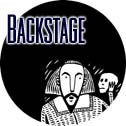
Comment
on this story
What:
Who's Afraid of Virginia Woolf
When:
Thursday-Saturday at 8 p.m.; Sunday at 3 p.m. through June 16
Where:
The Bijou Theatre, co-produced with the Actor's Co-op
Cost:
$10/$12. Call 656-4444 for more info.
|
|

This razor-edged production proves why you should be afraid
by Paige M. Travis
For several years now I've wanted to see a local theater company do a gritty modern play, some David Mamet or Sam Shepard production with plenty of cussing and fighting. Perhaps that desire was my response to being tired of seeing plays that are either uplifting or melancholy, often moving but without a real edge. I wanted a drama to poke me in the eye—the heart, the gut, unapologetically—with a sharp stick. Well, I got what I asked for from the Actors Co-op/Bijou Theatre production of Who's Afraid of Virginia Woolf.
Edward Albee's famous American play, first produced on Broadway in 1962, is about George and Martha, a couple determined to humiliate and dehumanize each other with cruelty, profanity, hatred and alcohol. Though their violence is rarely physical, their viciousness is terrifying. In 1962, the play stunned and thrilled audiences who had never seen such painful realism portrayed on stage. But in an age when we are numb to violence, TV shows are driven by reality and cruelty is often synonymous with humor, can this portrait of personal destruction have any real impact?
If the critical and popular acclaim for the film American Beauty is any indication, there is a modern appreciation for portrayals of individuals in turmoil. Director Mike Leigh has made several films about family that are uncomfortable to watch (Secrets and Lies, Life is Sweet), and Neil LaBute's Your Friends and Neighbors comes to mind as well. Virginia Woolf belongs in this category: dramas that are like car wrecks, so horrible and yet so captivating you can't look away.
Clearly, Virginia Woolf is not a play to be undertaken lightly or without a good cast. Actors Co-op has assembled three of its veterans—Pat Fitch as Martha, David Alley as Nick and Katie Norwood as Honey—plus longtime local and national actor Bruce Borin as George. The three acts take place in George and Martha's living room late one Saturday night after a party for faculty at the small New England college where Martha's father is president and George is in the history department, unpromoted after 20-something years. George and Martha arrive home first, drunk and fussy. Nick, a new faculty member, and his wife Honey come by later for more drinks...and games.
Although Albee's script calls for Martha to be "ample, but not fleshy," (a perfect description of Elizabeth Taylor in the 1966 film version) Fitch's angular and strong physique works well. She hands out every verbal lashing with muscle, and her seduction of Nick is boldly sexy. Alley is too wiry and smart-looking to be a real jock, but he does a good job of starting out as a yes-man and then wising up to George and Martha's wicked game. As Nick's beaming (and increasingly drunk) young wifey, Norwood is fresh-faced and innocent, with her '60s bouffant and joyous, impossibly wide smile. They are all beautiful to behold, leftover perfections from the mythical '50s.
George and Martha fight over, around and straight through the unsuspecting couple, their unwitting audience and pair of pawns. As they charm and hiss, bob and weave, casting insults like the fiercest enemies, it becomes clear that this game is a way of life for George and Martha. They despise each other and themselves. They blame each other for their disappointment and failure. They sling endearments like epithets. They've been playing this game so long, they can't tell when it's time to give up; even when they're exhausted and are tempted to lay down their arms, they can't stop. Without the fighting (and the drinking), they have nothing.
Each actor handles the dialogue beautifully, in banter and in the ebb and flow of game-playing. Of them all, Bruce Borin is the most mesmerizing. His delivery and body language is impressively effortless. Perhaps it is the sheer realism of his performance that makes the play so disturbing; we can almost believe that we, like Honey and Nick, are beholding this couple tear each other to bits. Why don't they just leave? And why don't we?
Yes, it is only a play, but it's brutal and so frightfully true. Director Amy Hubbard has let these players shine through without conforming to a concept or fulfilling any other notion than Albee's written word.
Some of Albee's slang and profanity is dated, but his turns of phrase, his plays on words, are right on target. When it's comedy, it's very black; we laugh, but hesitantly. This is a bloodbath we're witnessing. I wished for gunplay or a fistfight to finally physicalize their murderous intent. But to see one partner win or lose isn't the point. No one wins this battle.
Even at their most venomous, George and Martha are sympathetic because they have been wounded to the core—by life, by love, by each other. That is the sting of truth that lasts long after the curtain call. These two may have gotten less than they wanted from life, but I got much more than I expected from Virginia Woolf: a sympathetic hangover from all the liquor consumed and, more significant and long-lasting, the highly charged experience of an unforgettable production of one of this century's most gritty and complex modern dramas.

June 14, 2001 * Vol. 11, No. 24
© 2001 Metro Pulse
|